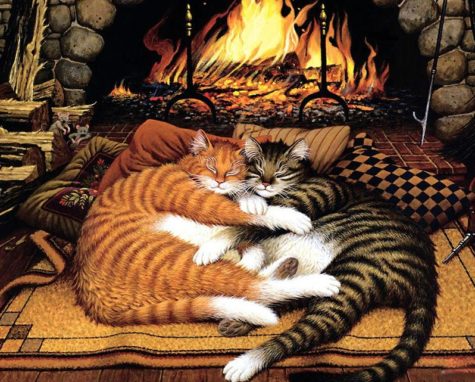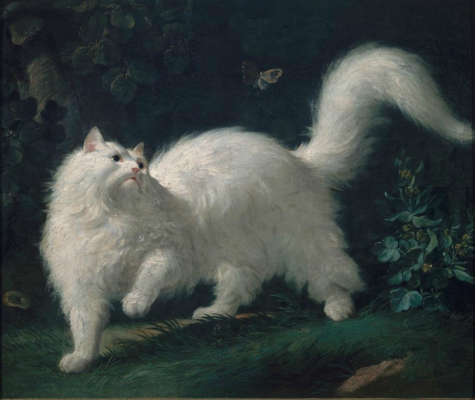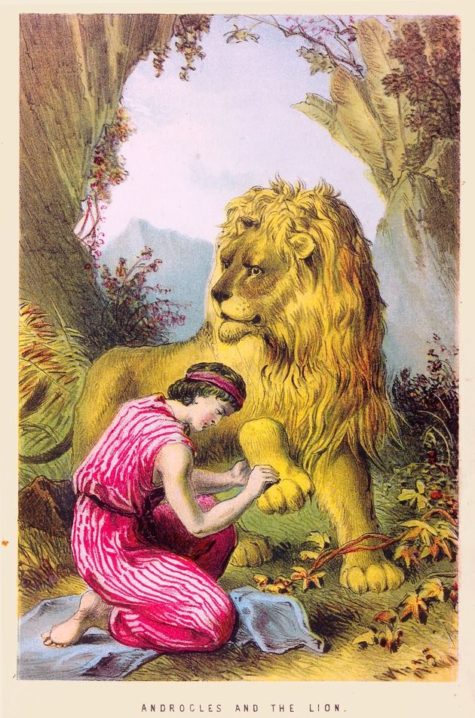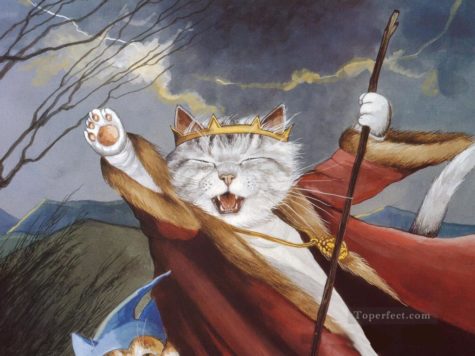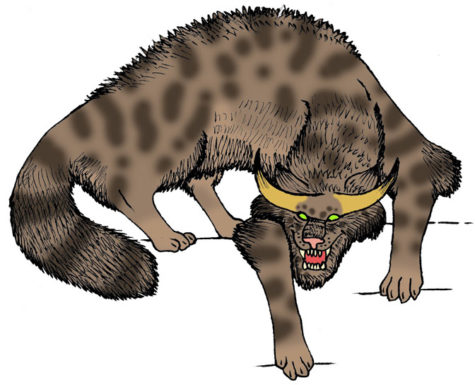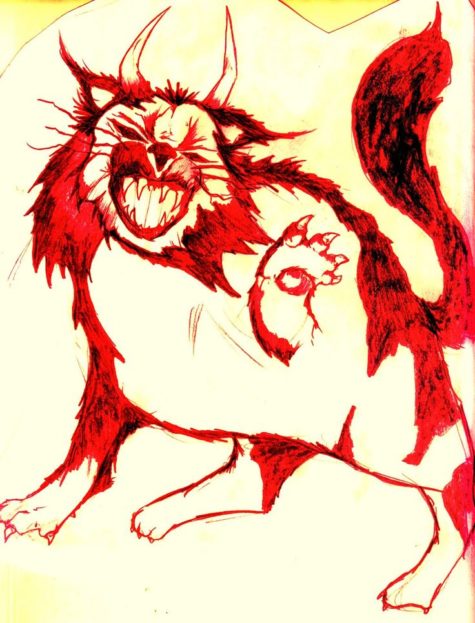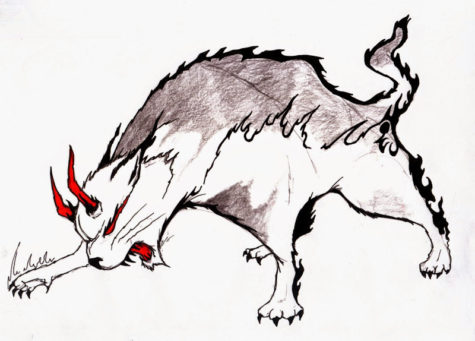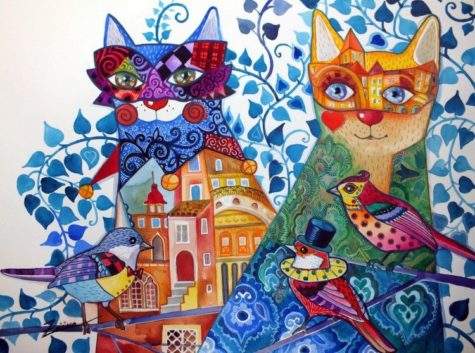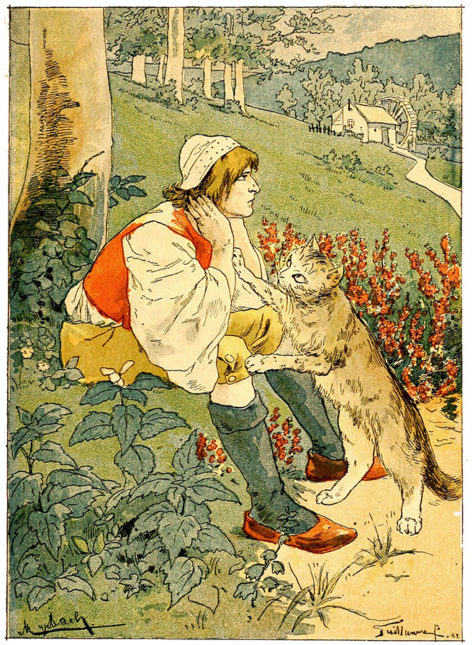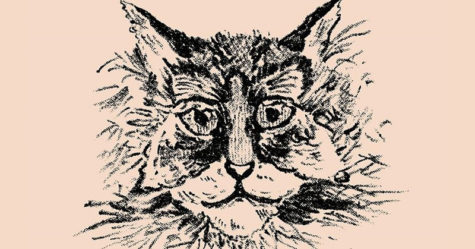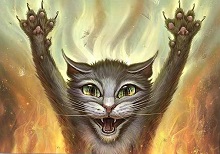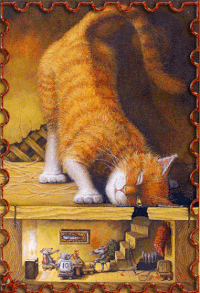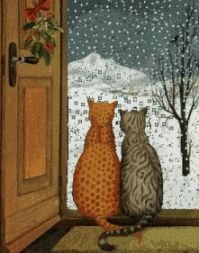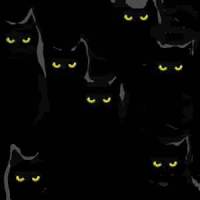Fictional Felines
The Kitten and the Hungry Fox
This story is from a less kind and gentle time when foxes in farmyards were about as welcome as rats and robbers, and so the ending to the story was much more entertaining (and less horrifying) than it is now, when most of us think foxes are just as cute as kittens.
One night, a hungry fox came upon a kitten in a farmyard and decided that the kitten was exactly the right size for a meal.
“Please don’t eat me,” begged the kitten, “If you spare me, I’ll show you where the farmer hides his big rounds of cheese and you’ll get a much better meal than my poor skin and bones!”
The hungry fox agreed to spare the kitten and the kitten led the hungry fox to the farmer’s well.
“Look down there,” said the kitten, “That’s where the farmer hides his cheese. Look how big it is! There’s enough there for us to share if only you will fetch it, for I’m far too small to go down on my own.”
The fox looked down and saw, at the bottom of the well, a huge white creaming round of cheese. He began to drool in hunger and wanted the cheese all for himself, for not only was he hungry, he was also greedy and not of a mind to share the prize with the kitten. However, he made a play of being willing to share the cheese.
“But how can I reach it you tricksy little kitten?” the fox asked, “You have shown me the cheese, but not how to get to it!”
“If you sit in the bucket, I can lower you down to the cheese,” replied the kitten, “Then I can pull you and the cheese up and we can share the prize.”
“How do I know you won’t just leave me down there?” asked the suspicious fox, “We will both go down in the bucket, and both climb up with the cheese. That way I know you can’t trick me.”
So the fox and the kitten both went down the well in the bucket. As soon as the bucket hit the water, the great creamy round of cheese disappeared! The fox then realised that he had been tricked and that what he had taken to be cheese had been the moon’s reflection on the still surface of the water. Angrily, the fox turned to the kitten, determined to eat the trickster, but he was too late. As soon as the bucket had hit the water, the kitten had sped up the rope to freedom. The much heavier fox tried to climb the rope but succeeded only in pulling the rest of the rope into the well. Thus the kitten was saved and the hungry fox was drowned.
Found at Moggycats Cat Pages
The Cat in the Fireplace
Once upon a time there lived a man and his wife in an old cottage. The couple rarely had enough money for comforts and sometimes not even enough money for bread or for wood for the fire. Their only companion was a black tomcat with great golden eyes.
One evening, in the cold winter, the couple watched their small fire burn out. They had no more wood to put on the fire as the weather was too bad for them to venture out to collect fallen branches. So they sat huddled in blankets, lamenting their bad luck and poor station in life, by the ashes until the ashes had grown cold and the couple had fallen into despair.
Then the woman noticed two embers still glowing and flickering at the back of the fire. Though they had no wood with which to kindle a fire, the cheerily glowing embers made them feel warmer and less sad and they began to talk of happier things. Late into the night they talked of happier times and began to be more optimistic about the future. But eventually, even the two glowing coals seemed to be burning out.
“I’ll blow them into life,” said the man and he blew gently into the fireplace.
With a great screech, their black tomcat shot up out of the fireplace and up the chimney. The glowing, flickering embers had not been embers after all, but had been the cat’s eyes glowing and blinking back at the couple as they talked. As the cat had begun to fall asleep the embers had seemed to die.
The man and his wife had been kept warm through the night by their own optimism and realized that their greatest possessions were not wealth and objects, but each other and their cat.
Found at: Moggycats Cat Pages
The Cat of la Croix des Haies
One evening, the good Pichard was returning from Haute-Chapelle, near the pond of Bain, where he had been courting his betrothed. At the foot of the cross in the square called la Croix des Haies he saw a beautiful big white cat. She miaowed tenderly, and crossed over to rub herself against his legs. From that day, every evening and at that same spot he would meet this lovesick cat. So it went on until he was married to Nanon, his fiancée.
Months passed and Pichard forgot his encounters with the white cat. Then, one night, he awoke with a start to discover he was alone in bed. His beautiful Nanon was nowhere to be seen. Pichard found this very strange. Stranger still, in the early hours of dawn, just as he was opening his eyes, his wife quietly slipped into the bed. Pichard questioned her, but though he became annoyed, threatened her and finally sulked, she did not say where she had been, except to say she was a faithful wife to him.
Though Pichard sulked and glowered, that evening he lay down beside her and all seemed normal. Suddenly, at midnight, Pichard woke to find Nanon was again gone, but the great white cat from la Croix des Haies was purring beside him in the room. Still sulking, he went back to sleep and in the morning his wife was beside him again.
Night after night the same thing happened. Pichard wondered how his wife got out since the door was firmly bolted. Fascinated, he set himself to watch. Though he fell asleep before his wife left, he managed to wake up nearer dawn and kept himself awake to wait for her return.
To his surprise, he saw a small white paw slipping through the doorway to reach the bolt. Softly Pichard rose, and struck the intruding paw with a thunderous blow of his hatchet, chopping it clean off. A horrible scream came from the other side of the door.
For eight days Nanon did not appear. Eventually she returned, her head low, her face flushed with confusion. She passed her husband, went straight to her bed without a word and wept. Pichard saw that her hand had been chopped off at the wrist.
Found at: Moggycats Cat Pages
Androcles and the Lion
This is the story of Androclus according to Apion. Apion was a 1st century AD. Greek grammarian and commentator who claimed to be an eyewitness to events. The tale has also been told as “Andy Rockles and the Lion.”
One day in Rome the people were being entertained by the fighting of several strange beasts, and principally of lions of an unusual size. Amongst the lions, there was one who stood out from the rest through his furious deportment, his size and strength and his loud and dreadful roaring. Amongst the other slaves being made to fight the lions was one called Androclus of Dacia. Androclus, belonged to a Roman lord from the consulate.
On seeing Androclus, the huge lion suddenly stopped, as if wondering what to do. It then softly approached the slave in a gentle and peaceable manner, as if to greet him. The lion then began to wag his tail, like a friendly dog, and nuzzled and licked the hands and thighs of the poor slave who was almost dead with fear. Recovering his composure, Androclus appeared to recognize the lion and caressed it to great applause from the spectators. The emperor demanded to know the cause of so strange an event and called the slave to him.
Androclus explained that his master, the proconsul in Africa, was cruel and beat him daily. Androclus had run away and, afraid to take refuge in towns, had hidden in a sandy, uninhabited area, resolving to kill himself if he could not support himself. During the heat of noon, he sheltered in an almost inaccessible cave.
Soon afterwards, a lion entered the cave with one foot wounded and bloody, complaining and groaning with pain. Androclus had been terrified, but the lion had spotted him and approached gently, displaying its wounded paw as if asking for help. Androclus drew out a great splinter and, growing a little more familiar with the lion, squeezed dirt and gravel out of the wound then wiped and cleansed it.
Now much more comfortable, the lion fell asleep with its paw still in Androclus’ hand. From then on, the slave and the lion lived together in the cave for three whole years, eating the flesh of the beast that the lion killed. The lion allowed Androclus the best pieces, which the slave roasted in the sun.
Androclus eventually grew tired of his wild and brutish life. While the lion was hunting, Androclus escapred from the cave and, three days later, was taken by Roman soldiers. The soldiers returned him to the proconsul who condemned me to die in combat with wild beasts. It seemed that the lion was also captured and had recognised and greeted Androclus in the arena.
That was the story that Androclus told the emperor and which was retold to the people. Androclus was absolved from his sentence and set free. The lion was, by order of the people, presented to him. The people later saw Androclus leading this lion, in nothing but a small leash, from tavern to tavern at Rome, and receiving what money everybody would give him, the lion being so gentle, as to allow itself to be covered with the flowers that the people threw on it.
The King of Cats ~ A British Tale
This is an old British tale about the King of Cats. It’s somewhat different from the Irish story of the King of Cats, which can be found here.
Once upon a time, a man had a calf to sell and decided to go to the November fair in Macroom. He borrowed a horse and cart from a neighbour and was to set off for the fair at about one o’clock in the morning to be sure of arriving nice an early and getting a good price. At one o’clock, he got up and looked outside. The night was too black to see anything, so he stirred the fire into life and put on a kettle for a cup of tea while he harnessed the horse.
There was a heavy mist coming down and the man was wet through by the time he had harnessed the horse and was ready for a hot cup of tea. He thought it was a foolish thing to be doing – going out on a cold, wet night to travel twenty miles in the dark, with only the lanterns on the sides of his cart to show him the way. Still, it had to be done, so he put on a thick coat and set off. The horse was just as unwilling to travel on that cold, wet night and would far rather be sleeping in its stable. Barely and hour had passed and both man and horse were wet through and miserable.
As they drew nearer to the town, the man could see the lights in the farms by the roadside, where the people were getting up for the fair – people who lived close enough to Macroom that they did not have to travel in the middle of the night. Soon there was quite a procession of people on the road with calves and cattle being driven to the fair. It was still dark and the daylight was only just coming.
The man took his place in the fair, and no one made him an offer for the calf for a long time. A few made offers of poor prices and other farmers told him that the prices were low anyway. In the end, cold and dejected and tired from lack of sleep, he accepted an offer, though the price was not a good one, rather than be left to take the calf home again which would have meant a wasted journey.
Cold, wet and hungry, he made a few purchases and then met with some friends for some bread, cheese and ale before they all set off for their homes. He was not looking forward to the long journey home, but at least a full stomach and a quaff of ale raised his spirits a little.
He let the horse go at her own pace and though the rain came down again, the man fell asleep wrapped in his greatcoat and huddled on the driver’s seat of the cart. Dozing fitfully, he barely heard the other travelers passing him, but he began to have strange dreams that could scarcely be told from reality.
As he was passing the graveyard of Inchigeela, a cat put his head through the railings and said to the man, “Tell Balgeary that Balgury is dead.” The man paid little heed to that, for he was too tired to know if it was real or just the product of his exhaustion. At last he arrived home and settled the horse in the stable with hay and water and went into the house to change out of his wet clothes.
His wife immediately began to ask about the fair – how many were there, whether he got a good price for the calf and whether he had heard any news while in town. After replying to questions, the farmer told her to be quiet a while and fetch him some tea to warm him through.
His wife fetched the tea and asked again if there was any news from town – people that had died, babies that had been born, people that had moved into or out of the area and people that had married since last time the farmer had been to town. Her husband told her he had been too wet and tired to stand around gossiping at the fair.
“Fancy going in all that way and hearing nothing at all,” complained his wife, “And not getting a good price for the calf either. You might as well have stayed at home for all the good that you get out of a fair.”
Finally, the man remembered the strange thing at Inchigeela and said “The only news, if you can call it that and not a dream, was when I was passing the graveyard of Inchigeela. A cat stuck his head out of the railings and said ‘tell Balgeary that Balguny is dead’.”
At that, their cat, sitting before the fine, jumped up and glared at the man. “The Devil fire you!” said the cat, “why didn’t you tell me before? I’ll be late for the funeral. It does no good for the heir to be late.”
And with that, the cat leapt through the cracked open window and was gone like the wind. From that day on, the farmer and his wife saw no sign of him.
Horned Demon Cat
Found in Cats of Magic, Mythology, and Mystery, this is reputed to be a true story of the Horned Demon Cat of World War II.
It could have been a scene enacted from Dante’s ‘Inferno’ – even the clouds seemed to be wreathed in flames as torrent after torrent of plummeting German bombs screamed through the darkened skies over south London, and danced a fiery tarantella of death upon its shuddering streets, like a flurry of shrieking souls in everlasting torment. And in the midst of this panorama of pandemonium was Howard Leland – one of many volunteers with the ARP (Air Raid Precautions) who had been boldly defying the deadly rain of missiles throughout that fearful evening in October 1943 in a desperate bid to minimize its malevolent effects. Little did Leland realize, however, that he would soon encounter something infinitely more sinister, and malign, than anything conjured forth by the wartime enemy.
As the ground reverberated from the intensity of yet another mighty explosion nearby, Leland ran into a deserted house to take shelter, until the immediate danger had passed. The building’s interior was pitch-black, but with the aid of his torch he located a staircase, and rested on the bottom step for a while, waiting for this latest airborne assault to end.
Suddenly, a cold shadow of fear swept across him, for as he sat there he realised – indefinably but undeniably – that he was no longer alone in that house. Something – not someone – else was here too, close by, and watching him. Unbidden, his eyes gazed upwards, to the top of the stairs, and the feeling intensified. Surely there, concealed amid the stygian gloom, was the source of his fear – and now he would reveal its identity.
Leland switched on his torch again, directing its penetrating beam onto the topmost stair – and beheld a hellish sight that transfixed him with fear, expelling from his mind all of that evening’s previous horrors in an instant. Crouched upon the stair was a huge hairy beast with tabby-like stripes of black and brown, clawed paws, and blazing eyes like glowed like twin infernos, mesmerizing Leland with their incandescent gaze. It would have resembled a monstrous cat – had it not been for the pair of sharp pointed horns that protruded from its skull!
For almost a minute, Leland remained motionless, held in thrall by the cold aura of palpable evil that radiated inexorably from the beast’s unblinking eyes – and then it moved! With a single colossal leap, it sprang from the stair, plunging down into the shadowy room – but before it reached the ground, it had vanished. Yet its presence had not entirely gone – for Leland could plainly hear a spine-chilling yowling cry, echoing in the empty room.
At that same instant, however, the sound of human footsteps came from the open front door – and the spell was broken. The eldritch cries ceased immediately, and through the door walked two of Leland’s ARP comrades. Their reassuringly familiar forms and voices swiftly dispersed the shroud of terror that had encompassed Leland only moments before, and encouraged him to recount his chilling experience. Neither of his friends had heard anything when entering the house, however, so he did not expect them to treat his account seriously – which is why he was so surprised when they listened silently and with grave expressions throughout his story, making no attempt to scoff or scorn his words.
When Leland had finished, his friends informed him that he was not the first person to have spied the feline monster. On the contrary, it had been seen by many different eyewitnesses over a period of several years, and the sightings were always the same – an immense horned cat with demonic eyes, squatting at the top of the stairs.
Nevertheless, in the hope that a more straightforward explanation may be forthcoming, the three men walked up the stairs and searched everywhere thoroughly for any physical evidence of the creature’s reality, but nothing was found.
Still disturbed by the memory of this grotesque entity but anxious to uncover its identity and possible significance, two days later Leland visited a renowned clairvoyant, John Pendragon, and recalled to him his encounter. After listening intently, Pendragon located the house on a large map of London, then placed a forefinger on the precise spot marking it.
At once, Pendragon’s mind was filled with a whirling vista of cats – countless furry wraiths swirling all around at the top of the deserted house’s stairs in a screeching, spitting vortex of feline fury, a mad maelstrom of undying hate. And at its very centre was something much larger, but it was not a cat – not even a horned demon cat. It was a man – haggard and despairing, with a noose in his hand, about to place it around his own neck.
After describing this vision to Leland, Pendragon asked him to make enquiries among the house’s neighbours, to discover whether any details of its history and of its previous owners corresponded with those in his vision. A week later, Leland returned, bearing some extremely interesting (and vindicating) news.
One of the house’s former inhabitants had been an ardent practitioner of the black arts, in the vain hope of improving what he had perceived to be a wretched, unfulfilled life. In accordance with one particularly grisly ritual, he had routinely slaughtered numerous cats for sacrifice upon an unholy altar. Ultimately, the balance of his mind had become totally unhinged, and he had committed suicide – hanging himself with a noose, suspended from the banister at the top of the stairs. Shortly afterwards, the great horned cat was seen there for the first time, and spectral yowling cries have often been heard since too.
Was the horned demon cat an elemental?
When Leland asked his opinion as to this monster’s precise nature, Pendragon suggested that it was probably an elemental spirit – one whose feline appearance and vitriolic hatred had been created by the restless ghosts of the departed sorcerer’s many feline victims, and which would linger indefinitely in the grim locality where they had all met their terrible deaths.
Although the vast majority of Britain’s mystery cats are unquestionably exotic non-native cats that have escaped or have been deliberately released from captivity, or are simple misidentifications of common animals, some investigators have speculated whether a few of them may in reality be paranormal (zooform) entities ‘disguised’ as big cats – as would certainly seem to have been the case with London’s horned demon cat of World War Two.
Incidentally, it should be noted here that although the original source of this case was John Pendragon’s autobiography, Pendragon (1968), which was written in collaboration with paranormal mysteries writer-investigator Brad Steiger, it only contained a fairly brief account of events. However, Steiger’s own book, Bizarre Cats (1993), included a much more detailed, greatly expanded version as related to him by Pendragon, which not only emphasized the entity’s feline nature but also incorporated other noteworthy additional information – such as the full name of the eyewitness (merely referred to by his initials in Pendragon’s book), and the hideous cat-slaying rituals performed by the man who had subsequently committed suicide in the house where the horned demon cat was later seen.
The Priceless Cats
This is an Italian version of the 12th-century British folk tale, “Dick Whittington and His Cat”, with a somewhat different ending.
Among the ancient Romans there was a proverb that those who are greedy never have enough, and since the Romans were Italians, the proverb still holds true. In the golden city of Venice they tell a tale that proves this time-old saying.
There once lived in the city by the sea two merchants who were neighbors. Both were rich. Both had grand palaces on the green, shimmering canal, with proud gondolas tied to cinnabar-and-yellow-striped poles. And both had lovely young children who were friendly and played with one another. As for the merchants, one was as different from the other as a black pebble from a shining ruby. One was hard and sharp and greedy, wanting whatever he saw, whether he needed it or not, while the other was generous and good, working to help not only himself but others as well. The two merchants knew each other and spoke to each other, but when it came to business, Mr. Greedy-Wolf was wary and watchful, not trusting anyone, not even himself
So time went by, with these two buying and selling, working and growing. There came a day when Giovanni, the good merchant, set out on a far journey to trade for spices, which were much sought after in Europe then. He loaded his vessels with toys and corals and silks and beautiful glassware to exchange for pepper and cinnamon and vanilla and curries and other scented spices that grew on the islands far away.
Don Giovanni sailed for days and weeks and then came to the rich East, where he traded from island to island, with benefit to himself and satisfaction to the islanders. One sparkling morning he came to a harbor that was as still as a graveyard, with masts hanging like tombstones. The streets and the markets were quiet as the night.
The merchant and some of his men walked about, disturbed only by their own footsteps. Where were the hustling and bustling townspeople dressed in colorful clothes? Where were the smells of spices and the cries of vendors that usually filled the air of a busy city? Finally the traders from Venice met two men who took them before the King. The ruler sat on his throne with a sorrowful face and head bowed low. Courtiers stood around, no different from the King.
“Can we trade with your people, Your Majesty?” the Venetian merchant said. “We have rich goods from our land that we would gladly exchange for spices.”
“Master merchant,” said the ruler, “our spices are ravaged, our grain is destroyed, our food is ruined. It is a wonder we are alive, because of the terrible plague that has come over our land. Everything is slowly being destroyed – even our clothes.”
“And what is this terrible plague that has brought your land such unhappiness, Your Majesty?”
“Gnawing rats and scuttling mice! They are in our homes and clothes and in our fields and roads. We have set traps for them and we have strewn poison in the pantries, but that has done more harm to our animals than to our pests. There seems to be no remedy for this curse.”
“Have you no cats?” the merchant asked.
“Cats? What are cats?”
“Why, cats are furry little animals like small dogs, and they are the mortal enemies of mice and rats, destroying them wherever they find them!”
“Where can I find these cats?” the King cried. “I’ll pay anything for them!”
“Your Majesty,” Don Giovanni said, “you do not have to pay for cats. We have many of them on our ship, and I will gladly give you a present of some; I am certain your pests will soon be gone.”
The King thanked the merchant, almost with tears in his eyes, and within an hour the merchant brought two fine cats; one, a black Tom as fierce as he was big, and the other a lovely tiger-striped lady cat who was famous for having many kittens and catching even more mice. The King and the islanders looked with awe and wonder at the two animals, for they had never seen cats before, and when they saw them set to work at once on the mice and rats, they were so overjoyed that they wanted to sing and dance.
The King was grateful from the bottom of his heart and wanted to prove this to the merchant, so he showered him and his crew with bales of spices and gleaming jewels, with sweet-smelling sandalwood and carved ivory, beautiful as a song.
When the merchant and his crew sailed home, they were so happy and contented that even the wind and waves knew it and led their vessel swiftly back to Venice. And the joy of Don Giovanni’s family was great when he reached home, and great was the excitement of his fellow merchants of Venice when they saw his royal cargo.
Don Giovanni met Don Cesare, his neighbour, before the golden church of San Marco, that treasury of beauty in the world. They spoke of this and that, about the journey and the trading, and then Don Giovanni told Don Cesare how he had traded the richest merchandise of all for just a pair of common cats. Don Cesare’s tongue nearly hung out with greed and envy when they parted. Thereafter, day and night, Don Cesare could think only of how Don Giovanni had gained a treasure by giving away two worthless cats that any Venetian would pay to get rid of. He had no peace, and he was more restless than a horse with a thorn in his side. Green jealousy and greed ate into him like fire in dry grass, until he could stand it no longer. He had to go to that island and bring back as big, if not a bigger, treasure than had Don Giovanni.
He fitted out a splendid ship filled with the best of goods, golden vessels, brocades, carved corals. With such gifts the generous King should give him twice – no, three times – as many riches as he had given Don Giovanni. Soon Don Cesare reached the island. He told the King he was a friend of Don Giovanni. The King received him with open arms, only too happy to welcome a friend of the man who, by his generous gift, had rid the island of the terrible pests.
Don Cesare told the King he, too, had brought him gifts – gifts much more valuable than those of Don Giovanni. Then he presented his gifts of golden cups and carved corals, rich brocades and gilded embroideries – the richest Venice could show to prove his friendship. Truly the emperor was overwhelmed by this show of unselfish generosity. He was a simple and an honest man, and appreciative as well, and he thought hard how he could repay the friendship shown by Don Cesare. Try as he would, he could think of nothing rich enough and fine enough. In the end he called together his counsellors to decide what to give to Don Cesare in return for the lavish presents, which, the King thought, Don Cesare had given out of the kindness of his heart.
Each elder had his say. In the end, one rich in wisdom arose and said, “Oh, King, this man from Venice has given to you and to us things that will be a joy to look at for years to come. Truly, we in our little island have no gifts to equal his. We could give him spices and perfumes and woods, but these are simple things growing freely in our land. They come and go every year. But there is one thing we possess now that is of great value in this world. . . .”
The King set a day for the great royal audience to present the merchant with his reward. All the counsellors came, and as many people as the room could hold, and then the merchant appeared before the King. He came with light steps and greedy thought, thinking of the riches he would reap now – riches that would surely be greater than those Don Giovanni had received. There were blowing of trumpets and beating of drums and many fol-de-rol speeches of friendship on the part of the merchant.
In the end the royal master said, “Don Cesare, you came to our land and gave me kindly gifts freely from the goodness of your heart. That is a fine thing for a man to do. And, as the saying goes, from seeds of goodness grow rich purple plums of goodness. I and my counsellors thought for a long time how to reward you properly for such unselfish generosity, and finally we decided on the most valuable gift we have.
“When my people and my land were in their greatest distress, a countryman of yours saved us by giving us a gift. It was a gift more precious than gold or diamonds or spices. We have been unable to think of anything more wonderful than the same gift for you. We know it will bring you the same joy and peace it has brought to us. Soldiers, bring the golden cage with the royal gift for Don Cesare!”
Then two soldiers came in with the golden cage in which two little kittens were playing in a way that was a joy to behold. The soldiers stopped with the cage before the merchant. The King smiled happily, as did the courtiers and the people. The merchant looked at the kittens, but he could not say a word, and when he saw everyone beaming and smiling at him, he had to smile, too – a smile that stretched from ear to ear. . . . Soon after he sailed homeward.
Gagliuso and His Cat
The familiar “Puss in Boots” story originally came from India and there were four different versions (discounting minor variations) between the early 16th century and middle of the 18th century. The most famous version was written by Charles Perrault in the l590s. Gagliuso is a version written in the early 1500s by Gianbattista Basile and ends very differently from the more familiar Perrault version.
A Fairy Tale From The Pentameron
Once upon a time there lived in Naples a poor old man named Gagliuso, so squalid and destitute that he was as naked as a worm. Feeling himself at the point of death, he said to his two children, Oratiello and Pippo, “My sons, I am summoned to pay the debt of nature. Believe me, Christians as you are, that my only regret in quitting this sad abode of toil and pain is that I leave you without a farthing. Alas! you will have less than a fly could carry off on his foot. I have led a dog’s life; I have dined off an empty stomach, and gone to bed in the dark. But in spite of all, I wish on my deathbed to leave you some token of my love. Oratiello, my firstborn, take that wallet hanging on the wall, and may you find in it every night what I have often sought in vain all day, a crust of bread. As to you, my youngest, take the cat. My children, remember your dear father.” With these words, he burst into tears, and a little while after said, “Farewell, it is night.”
Oratiello buried his father at the public expense; after which he plucked up his courage, and went down to the bay to help the fishermen draw the seine. But Pippo, looking at the cat, cried, “See what a fine legacy my father has left me! I cannot keep myself, and here I have two mouths to feed!”
The cat heard these lamentations, and remarked, “You complain without cause, and have more luck than sense. You do not know your good-fortune, for I can make you rich if I set about it.”
Pippo felt that she was right. He stroked the cat three or four times, and warmly besought the favour of Dame Puss, who took compassion on the poor lad. She went out every morning, to the bay, or the fish-market, where she managed to lay hold of some large mullet or superb sword-fish, which she carried to the king, saying, “Your majesty’s slave, Signor Gagliuso, sends this fish, with his compliments, as a small gift to a great prince.” Upon which the king, with the pleased air of one receiving a present, would answer, “Tell this stranger gentleman that I am infinitely obliged to him.”
Another time the cat would scour the fields and marshes, and when the hunters shot down a blackbird, lark, or woodcock, would snatch up the game, and hurry with it on the same errand to the king. She used this artifice so long that at last, one morning, the king said, “I am under so many obligations to Signor Gagliuso, that I should like to make his acquaintance and thank him for all his courtesy.” The cat replied, “Signor Gagliuso’s blood and life are at your majesty’s disposal. My master will wait upon you tomorrow morning without fail.”
Morning having come, the cat hastened to the king, crying, “Signor Gagliuso begs you to excuse him for not presenting himself before you. Some of his rascally valets ran off with his clothes last night; the thieves have not left him a shirt to his back.”
On hearing this, the king ordered a quantity of linen and wearing apparel to be taken from his own wardrobe and sent to Gagliuso. Before two hours had passed our hero entered the palace, escorted by the cat. The king received him most graciously, and seating him by his side, ordered a magnificent feast to be served him.
While they were at dinner, Gagliuso turned from time to time to the cat, and said, “Look here, Puss, keep an eye on our things!” to which she answered, “Hush! hush! don’t speak of such trifles.” The king asked what troubled Gagliuso, whereupon the cat said that he would like a small lemon, when the king sent to the garden for a whole basketful. But Gagliuso continued to repeat the same thing, while the cat tried to hush him, and when the king insisted upon knowing what was the matter, invented one excuse after another to conceal her master’s meanness, in thinking that anyone there would be likely to steal his hat and cloak.
At last, after sitting long at the table, talking of one thing and another, Gagliuso asked permission to withdraw. Left alone with the king, the cat extolled her master’s merit, wit, and good sense, and above all, the immense wealth that he possessed in the Roman Campagna and Lombardy. He was just such a son-in-law as a crowned head might desire.
The king, asking what his fortune might be, the cat declared that it was impossible to reckon the value of the goods and chattels of this Croesus, who did not know himself what he was worth. But if the king wished to be sure, it was a very easy matter; he had only to send some trusty messengers across the frontier, and they would learn for themselves that there was no wealth in the world like Gagliuso’s.
The king summoned his faithful counsellors, and ordered them carefully to inquire into the affair. They followed the cat, who, as soon as they had crossed the frontier, ran on before, on the pretense of preparing refreshments. Wherever she found a flock of sheep, cows, horses, or swine, she said to the shepherds, or keepers, “Look here! there is a company of robbers coming to plunder everything they find. If you wish to escape and save your property, you must say, ‘All this belongs to Signor Gagliuso!’ and they will not touch a hair.”
She repeated the same thing at all the farms along the way, so that, wherever the king’s messengers went, they heard the same song. All that they saw belonged to Signor Gagliuso. Tired of asking the same question, they returned to the king and told him wonders concerning Signor Gagliuso’s possessions. On hearing this the monarch promised the cat a heavy fee if she would make the match, and her friendly tongue bobbed back and forth like a shuttle till it had woven the whole intrigue. Gagliuso offered himself, and the king gave him a fat dowry with his daughter.
After a month’s merry-making Gagliuso told his royal father-in-law that he wished to carry his bride to his estates. The king accompanied them as far as the frontier, after which they went to Lombardy, where, by the cat’s advice, Gagliuso bought a vast domain with the title of baron. Master Gagliuso, on seeing himself as rich as a prince, thanked the cat in the warmest way imaginable, telling her over and over again that it was to her that he owed his wealth and grandeur.
The wit of a cat had done more for him than all his father’s sense. She might dispose of the property and life of her dear master as she saw fit. And when she died – would to heaven that she might live a hundred years! – he pledged her his word that he would have her embalmed and put in a golden casket, which he would keep in his chamber, that he might always have her cherished remembrance before his eyes.
The cat was greatly puffed up with all these fine speeches. Before three days had passed, she stretched herself at full length along the garden terrace, pretending to be dead.
“Husband! husband!” cried Gagliuso’s wife, “what a great misfortune! The cat is dead!”
“The deuce take her,” answered Gagliuso; “better that she should die than we.”
“What shall we do with her?” asked the princess.
“Take her by the paw and fling her out of the window.”
On hearing this funeral oration, which was not exactly what she was looking for, the cat jumped up, and cried: “So these are your thanks to me for cleansing you of your filth! This is your gratitude for stripping you of rags fit for nothing but a wad for a distaff! This is the way you reward me for feeding you, you scoundrel! for clothing you, you wretch! But it is wasting soap to wash an ass’s head. Accursed be all that I have done for you. You are not even worth the trouble of spitting in your face. A fine gold casket you have made ready for me! A splendid funeral you have ordered for me! Well, puss, you have sweated, laboured, and worn yourself out, to be paid in such coin! Fool that you were, not to know that service is no inheritance. The philosopher was right who said, ‘He who goes to bed an ass will get up an ass.’ The more one does, the more one may do. But fine words and foul deeds deceive wise men and fools alike.”
With these words she started for the door. Gagliuso followed and attempted in the humblest accents to soften her. His labour was in vain; she would not return, but went straight onward, without turning her head, saying, “Beware of enriching a pauper; he is sure to turn out a villain.”
The Cactus Cat
By William T Cox, from “Fearsome Creatures of the Lumberwoods, with a Few Desert and Mountain Beasts,” published in 1910, we have this description of the Splinter Cat, (Cactifelinus Inebrius).
How many people have heard of the cactus cat? Thousands of people spend their winters in the great Southwest – the land of desert and mountain, of fruitful valleys, of flat-topped mesas, of Pueblos, Navajos, and Apaches, of sunshine, and the ruins of ancient “Cliff-dwellers.” It is doubtful, however, if one in a hundred of these people ever heard of a cactus cat, to say nothing of seeing one sporting about among the cholla and palo verde. Only the oldtimers know of the beast and its queer habits.
The cactus cat, as its name signifies, lives in the great cactus districts, and is particularly abundant between Prescott and Tucson. It has been reported, also, from the valley of the lower Yaqui, in Old Mexico, and the cholla-covered hills of Yucatan.
The cactus cat has thorny hair, the thorns being especially long and rigid on its ears. Its tail is branched and upon the forearms above its front feet are sharp, knifelike blades of bone. With these blades it slashes the base of giant cactus trees, causing the sap to exude. This is done systematically, many trees being slashed in the course of several nights as the cat makes a big circuit.
By the time it is back to the place of beginning, the sap of the first cactus has fermented into a kind of mescal, sweet and very intoxicating. This is greedily lapped up by the thirsty beast, which soon becomes fiddling drunk, and goes waltzing off in the moonlight, rasping its bony forearms across each other and screaming with delight.
The Splinter Cat
By William T Cox, from “Fearsome Creatures of the Lumberwoods, with a Few Desert and Mountain Beasts,” published in 1910, we have this description of the Splinter Cat, (Felynx Arbordiffisus).
A widely distributed and frightfully destructive animal is the splinter cat. It is found from the Great Lakes to the Gulf, and eastward to the Atlantic Ocean, but in the Rocky Mountains has been reported from only a few localities.
Apparently the splinter cat inhabits that part of the country in which wild bees and raccoons abound. These are its natural food, and the animal puts in every dark and stormy night shattering trees in search of coons or honey. It doesn’t use any judgement in selecting coon trees or bee trees, but just smashes one tree after another until a hollow one containing food is found.
The method used by this animal in its destructive work is simple but effective. It climbs one tree, and from the uppermost branches bounds down and across toward the tree it wishes to destroy. Striking squarely with its hard face, the splinter cat passes right on, leaving the tree broken and shattered as though struck by lightning or snapped off by the wind.
Appalling destruction has been wrought by this animal in the Gulf States, where its work in the shape of a wrecked forest is often ascribed to windstorms.

